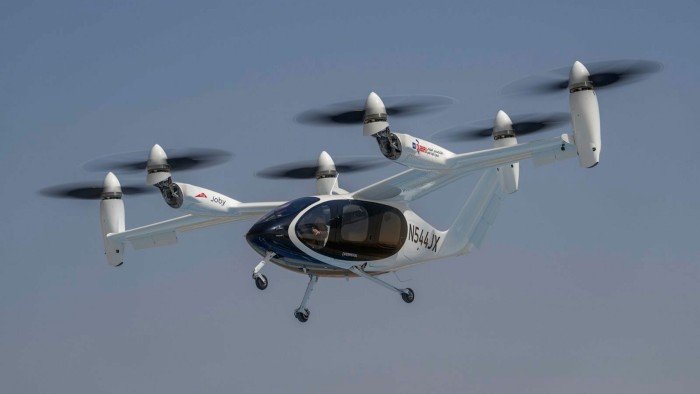Unlock the Editor’s Digest for free
Roula Khalaf, Editor of the FT, selects her favourite stories in this weekly newsletter.
US air taxi start-up Joby Aviation is a step closer towards launching its first commercial service as early as the end of this year after completing a series of piloted test flights in Dubai.
The company said the flights, where the aircraft successfully transitioned from vertical take-off to horizontal cruise before again landing vertically, mark a significant milestone in the nascent industry’s road towards commercial deployment.
Joby in April completed its first such “transition” flight in California but this is the first time the start-up has performed the tests as part of a test flight campaign before commercial launch.
The successful tests, which will take place throughout the summer, were a critical moment for the industry, according to Paul Sciarra, executive chair of Joby.
“People have been excited about [air taxis] but the real question has been ‘when’ and ‘in what way’ are these products going to get into people’s hands and begin to provide valuable service,” he told the Financial Times.
The tests meant that commercial services were now in prospect, he said, adding: “It will happen first in Dubai and then more broadly around the world, very soon.”
Founded in 2009, the California-based company is among several start-ups and aerospace incumbents hoping to make the vision of emission-free “urban air mobility” a reality through the launch of “electric vertical take-off and landing” (eVTOL) aircraft.
Early promises of a speedy revolution in air travel, however, have been slow to deliver. Several companies have been forced to tap investors for more funding and push back certification milestones as the challenges of developing these aircraft have become clearer. There are also other hurdles, such as building the necessary infrastructure and winning public acceptance.
China’s Ehang earlier this year received the necessary approvals from the country’s aviation regulator to start pilotless flights for its autonomous air taxi but these are limited to sightseeing and tourism.
Joby, which listed on the New York Stock Exchange in 2021, is among the better-capitalised players in the sector. It has raised more than $2bn in funding from investors and other backers, including carmaker Toyota, which is also a manufacturing partner.
The company’s air taxi is designed to transport a pilot and up to four passengers at speeds of up to 200mph. Sciarra said Joby was on track to start commercial services by the end of this year or early next. Construction has started on the first Joby commercial landing port at Dubai’s international airport.
In Dubai, said Sciarra, Joby had seen a “real willingness to get new modes of transportation into the ecosystem as quickly as possible”.
The company is going through the certification process of its aircraft with Dubai’s local regulator. It is also working towards getting full approval from the US aviation safety regulator, the Federal Aviation Administration.
Sciarra said Joby expected to secure approval first in Dubai, followed by US certification.
“We feel like from this toehold of commercial service in Dubai, then to US FAA certification . . . that allows us global reach in the short-term.”

